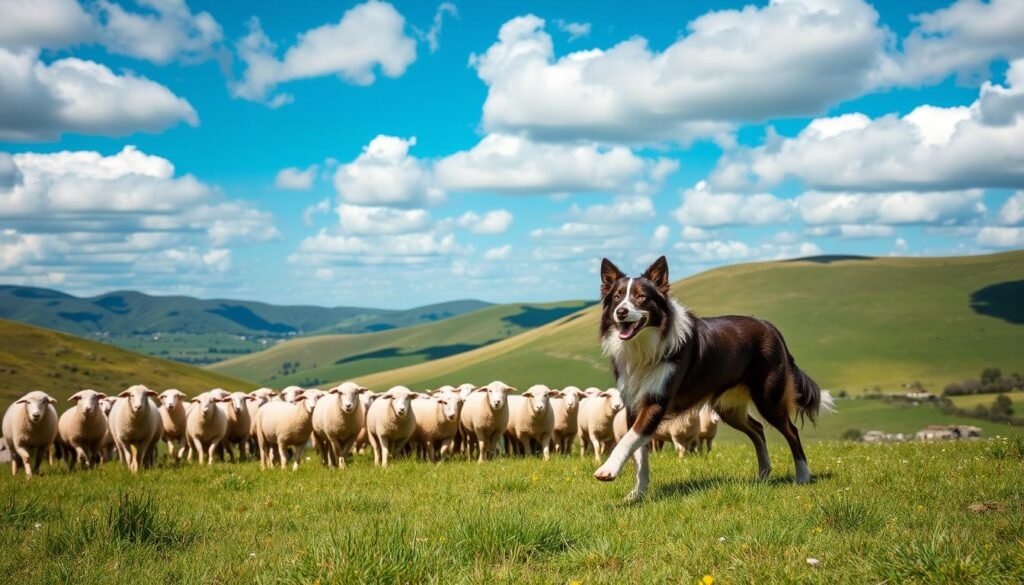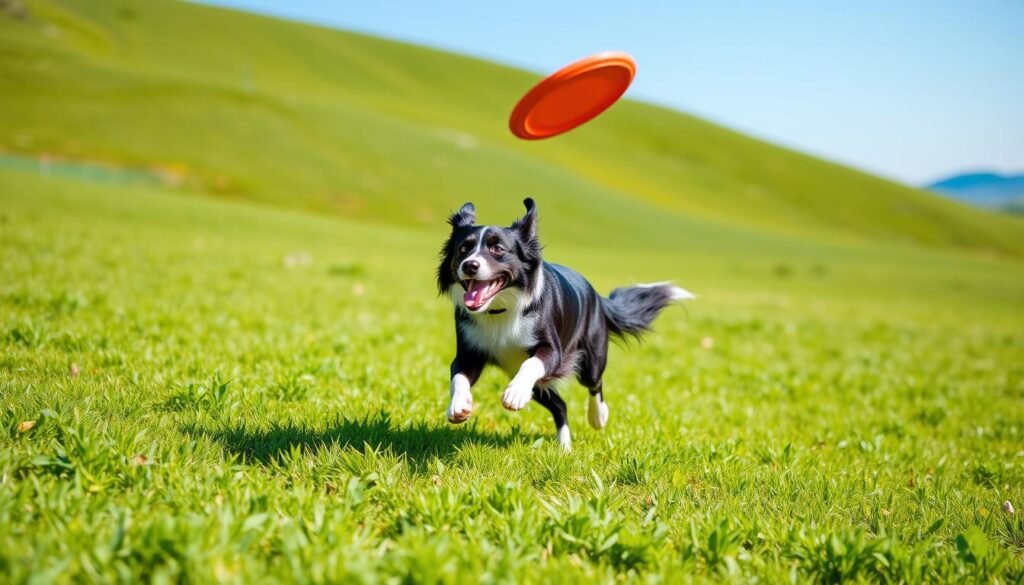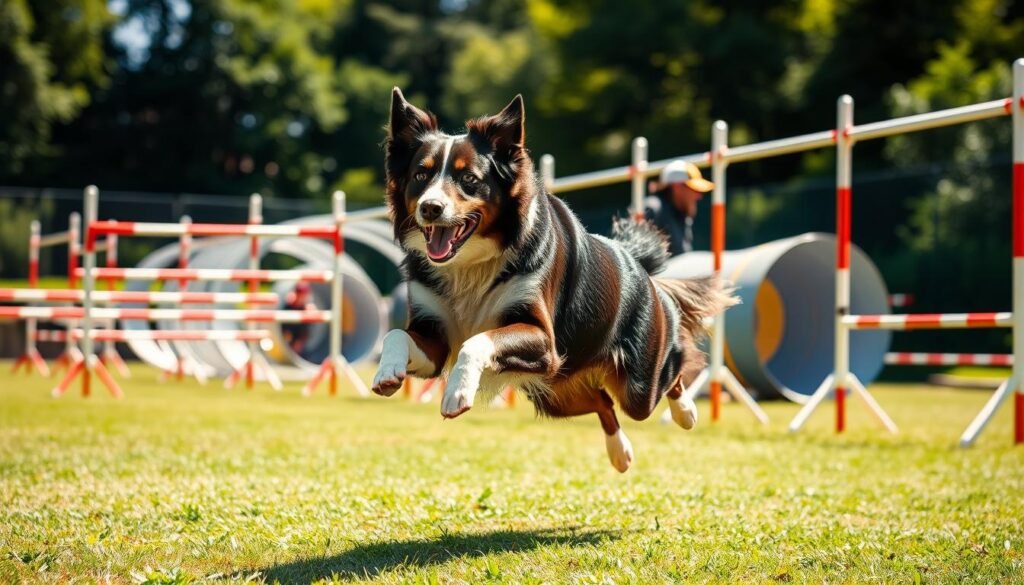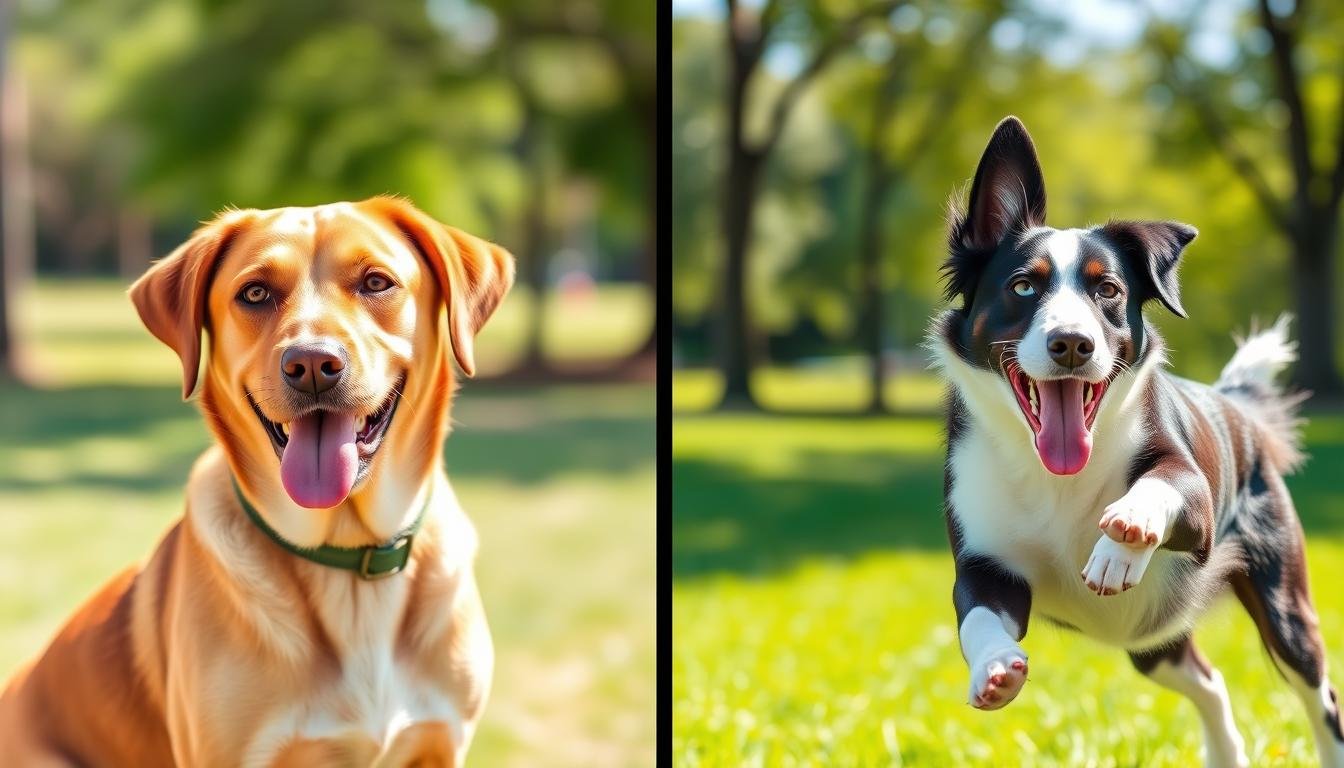Labrador Retrievers vs Border Collies: Which Breed to Pick
Did you know that working border collies are often used on farms for herding? This shows how smart and versatile these dogs are. When picking between Labrador Retrievers and Border Collies as pets, you face two of America’s favorite family dogs. Each breed has its own special qualities, making the choice an exciting look into dog traits.
Your lifestyle, energy, and family setup are key in choosing the right dog. Labradors are known for being friendly and easy to adapt. Border Collies, on the other hand, are super smart and full of energy. As you search for the perfect dog, we’ll guide you through the main differences between these two breeds.
Key Takeaways
- Border Collies excel in herding and agility tasks
- Labradors are known for their friendly and adaptable nature
- Both breeds require different levels of exercise and training
- Your lifestyle and family dynamics influence the best choice
- Consulting breeders can provide insights into puppy personalities
- Consider each breed’s unique traits for the perfect family dog
Overview of Labrador Retrievers
Labrador Retrievers are loved by many families for their friendly nature and great retrieving skills. These dogs have won the hearts of dog lovers all over the United States. Let’s explore the world of Labs and see why they are such great companions.
History and Origin
Labrador Retrievers come from Newfoundland, Canada. They were first used as working dogs to help fishermen. They were great at swimming and had coats that kept them warm in cold water.
Popularity and Recognition
Labs have been the top breed in the United States since 1991, according to AKC stats. They are friendly and easy to adapt, making them perfect for families. You can find Labs in many roles, like therapy dogs and search and rescue teams.
Temperament
Labs are known for their outgoing and patient nature. They are great with kids and other pets. Their love for people and desire to please make them excellent family dogs. They are confident, joyful, and always up for an adventure or a cozy day at home.
| Trait | Description |
|---|---|
| Lifespan | 12.5 years on average |
| Coat Colors | Yellow, Black, Chocolate |
| Exercise Needs | High – mental and physical stimulation required |
| Shedding | Year-round, heavy during spring |
Overview of Border Collies
Border Collies are known for their high intelligence. They are among the smartest herding dogs. Their history and traits make them a favorite among dog lovers.
History and Origin
Border Collies come from the border of Scotland and England. They started as skilled sheep herders. The first sheepdog trial with a Border Collie was in 1873 in Wales.

Popularity and Recognition
Border Collies are famous beyond farms. They’ve been in movies like “Babe” and “Snow Dogs.” Chaser, a Border Collie, knew over 1,000 object names, showing their memory and learning skills.
They are also good at sports. Border Collies have set records in skateboarding and balancing acts.
Temperament
Border Collies are full of energy and focus. They need at least an hour of exercise every day. They love Frisbee, swimming, and agility training.
They are smart and learn fast. But, they need constant activity to avoid boredom.
They bond strongly with their families but can be shy with strangers. Their herding instincts might make them try to herd family members or pets. They are playful but can be too intense for young kids or older adults. With the right training and socialization, they are loyal and loving companions for active families.
Physical Characteristics of Labrador Retrievers
Labrador Retrievers are a favorite dog breed known for their friendly nature and versatility. These dogs are medium to large in size. They have distinct physical traits that set them apart from other breeds.
Size and Weight
Labradors are sturdy dogs with a strong build. Adult males weigh between 65-80 pounds. Females are slightly smaller, weighing 55-70 pounds. They are about 21.5 to 24.5 inches tall at the shoulder.
Coat and Color Options
Labradors have a short, dense double coat. This coat protects them in different weather. They come in three main colors: black, yellow, and chocolate.
Labradors shed moderately all year. Regular brushing keeps their coat healthy and reduces shedding. Their short coat makes grooming easier compared to other breeds.
| Characteristic | Description |
|---|---|
| Weight | Males: 65-80 lbs, Females: 55-70 lbs |
| Height | 21.5-24.5 inches at shoulder |
| Coat Type | Short, dense double coat |
| Coat Colors | Black, Yellow, Chocolate |
| Shedding | Moderate |
Physical Characteristics of Border Collies
Border Collies are medium-sized dogs known for their unique look and energy. They have special physical traits that make them stand out.
Size and Weight
Border Collies are usually 18 to 22 inches tall at the shoulder. Males are bigger than females, weighing 30 to 55 pounds. Their size fits well in many homes, from big farms to small apartments.

Coat and Color Options
Border Collies have a double coat, which can be rough or smooth. The outer coat keeps them dry, and the undercoat keeps them warm. This helps them adapt to different weather.
They come in many colors and patterns. The most common is black and white. But you can also find them in red and white, tricolor, blue merle, and sable.
- Red and white
- Tricolor (black, white, and tan)
- Blue merle
- Sable
Grooming needs depend on their coat type. Brushing regularly is key to avoid mats and reduce shedding. In shedding seasons, you might need to groom more often to keep their coat and your home clean.
Exercise Needs of Labrador Retrievers
Labrador Retrievers are full of energy and need lots of exercise. They stay healthy and happy with regular physical activity. It’s important to know how much exercise they need to avoid behavioral problems.
Recommended Activities
Labradors love to stay active. They enjoy daily walks, swimming, and playing fetch. Make sure they get at least 1-2 hours of activity each day to keep them fit.
- Brisk walks or jogs
- Swimming sessions
- Fetch games with balls or frisbees
- Agility training
- Interactive puzzle toys
Signs of Insufficient Exercise
Labs that don’t exercise enough may act out. Look for signs like destructive chewing, too much barking, or gaining weight. They might also seem restless or seek too much attention.
- Destructive chewing
- Excessive barking or whining
- Weight gain
- Restlessness or hyperactivity
- Attention-seeking behaviors
It’s key to meet your Labrador’s exercise needs for their health and happiness. Regular activity helps them stay at a good weight, keeps their muscles strong, and keeps their mind active. With the right exercise, your Labrador will be happy and well-behaved.
| Activity | Duration | Frequency |
|---|---|---|
| Walks | 30-60 minutes | Daily |
| Swimming | 20-30 minutes | 2-3 times/week |
| Fetch | 15-20 minutes | Daily |
| Agility | 30 minutes | 1-2 times/week |
Exercise Needs of Border Collies
Border Collies are full of energy and need lots of exercise. They are smart dogs that need both physical and mental challenges. It’s important for owners to know how much exercise they need.
Recommended Activities
Border Collies love activities that keep them active and sharp. They should do:
- Two 30-minute walks
- Fetch or frisbee sessions
- Agility training
- Swimming
- Hiking
Adult Border Collies need 1-2 hours of exercise each day. Puppies need about 5 minutes of exercise for every month of age. As they get older, senior Border Collies need exercise that’s easier for them.

Signs of Insufficient Exercise
Without enough exercise, Border Collies can get frustrated. Look out for these signs:
- Destructive chewing
- Excessive barking
- Restlessness
- Digging
- Hyperactivity indoors
To avoid these problems, mix physical exercise with mental games. Use puzzle toys, teach new tricks, and play nose games. Regular exercise keeps your Border Collie happy and well-behaved.
| Age Group | Daily Exercise Needs | Mental Stimulation |
|---|---|---|
| Puppies | 5 min per month of age | Short training sessions, soft toys |
| Adults | 1-2 hours | Agility, herding balls, new commands |
| Seniors | Moderate (adjusted for health) | Gentle puzzles, leisurely walks |
Training and Intelligence: Labrador Retrievers
Labrador Retrievers are known for their friendly nature and trainability. A recent study by the University of Helsinki sheds light on their intelligence levels and training abilities. The research, conducted from 2016 to 2022, involved cognitive tests on over 1,000 dogs from 13 breeds.
Learning Capabilities
While Labs scored lower in problem-solving and inhibitory control compared to other breeds, they excel in other areas. Their eagerness to please and food motivation make them highly trainable. Labs are popular choices for service work, with a high success rate in this field.
Basic Training Tips
When training your Labrador, keep these points in mind:
- Use positive reinforcement
- Keep sessions short and fun
- Incorporate treats and toys as rewards
- Be consistent and patient
- Start training early for best results
Despite not topping the charts in all cognitive tests, Labradors remain one of the most popular breeds worldwide. Their combination of intelligence, trainability, and friendly disposition makes them excellent companions for various lifestyles.
Training and Intelligence: Border Collies
Border Collies are known for their high intelligence and training skills. They can understand over 1,000 words, more than most dogs. Their quick learning and problem-solving abilities make them unique.
Learning Capabilities
Border Collies are great at understanding social cues and solving puzzles. They excel in dog sports and activities. In a study with 1002 dogs from 13 breeds, they ranked first in problem-solving and impulse control.

Basic Training Tips
To use a Border Collie’s intelligence, follow these tips:
- Provide mental stimulation through puzzles and games
- Use positive reinforcement techniques
- Establish clear boundaries early on
- Be consistent in your training approach
- Offer 1-2 hours of daily exercise to maintain their high energy levels
Border Collies can have an “I know best” attitude. So, it’s important to guide them firmly but gently. Their unique traits, like heterochromia (two different colored eyes), make them even more special.
| Breed | Intelligence Ranking | Training Ease |
|---|---|---|
| Border Collie | 1st | Excellent |
| Poodle | 2nd | Very Good |
| German Shepherd | 3rd | Very Good |
| Golden Retriever | 4th | Good |
| Doberman Pinscher | 5th | Good |
Health Considerations for Both Breeds
When choosing between Labrador Retrievers and Border Collies, knowing about pet health is key. Each breed has its own health concerns. This knowledge helps ensure your pet stays healthy and happy for a long time.
Common Health Issues for Labradors
Labrador Retrievers often face health problems. Hip and elbow dysplasia can make it hard for them to move. They might also get eye issues like progressive retinal atrophy.
Another big issue is obesity. It can make joint problems worse. Keeping them active and eating right is crucial for their health.
Common Health Issues for Border Collies
Border Collies have their own health challenges. They can get hip dysplasia, just like Labs. Eye problems, like Collie Eye Anomaly, are also common.
Epilepsy is another condition they might face. These smart dogs need both mental and physical challenges to stay well.
Research shows Labrador Retrievers might have different walking patterns than Border Collies. This could mean more stress on their joints. Border Collies tend to put more weight on their back legs, which affects how they move.
Both breeds need regular vet visits, a good diet, and enough exercise. Knowing about these health issues helps you give your pet the best care. This way, you can enjoy a long, happy life together.
Final Thoughts: Choosing the Right Breed
Choosing the right pet is a big decision. Both Labrador Retrievers and Border Collies are great family dogs. But they have different traits for different lifestyles.
Lifestyle Considerations
Your daily routine is key in choosing between these breeds. Labs are friendly and adapt well to many settings. They need daily exercise but are more laid-back than Border Collies.
If you live in South West London with parks like Morden Hall, a Lab might be perfect for you.
Border Collies, however, have very high energy levels. They need lots of physical and mental stimulation. If you’re active and enjoy outdoor activities, a Border Collie could be ideal.
Personal Preferences
Consider your living space and family dynamics. Labs are often great with kids, making them excellent family dogs. Border Collies can also be wonderful pets but need more attention.
Both breeds need regular vet check-ups. Having a trusted local vet is important.
Remember, each dog is unique. Whether you pick a Lab, a Border Collie, or a cross-breed, the most important thing is finding a furry friend that fits your lifestyle and brings joy to your home.

